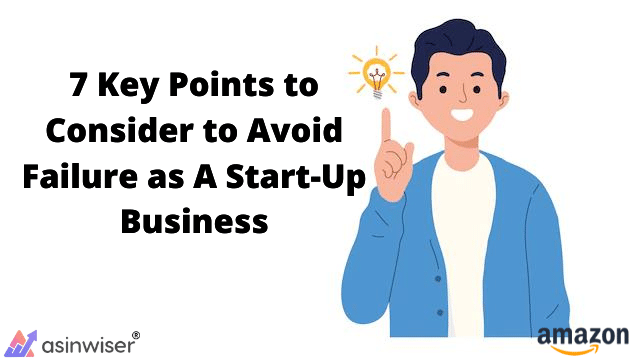
7 Key Points to Consider to Avoid Failure as A Start-Up Business
Apple, like Amazon, started as a small corporation. And both are making history regularly. Getting from a driveway to Silicon Valley takes a lot of dedication, aspiration, and hard choices. Do all businesses, however, give up the same amount of growth? NOT. Some enterprises fail spectacularly, while others take years to grow. Startups fail for a variety of reasons. What are the possible causes of failure, even if you have a marketable product? Small businesses fail for various reasons, as outlined in this article.
Why Do Entrepreneurs Fail?
1: Small Companies Do Not Have a Website
Customers use online services to keep in touch, entertain themselves, and shop. For brands, however, the internet has become synonymous with connecting with their potential customers. One of the principal factors small businesses fail is that they are still unaware of their true potential.
2: Outsourcing Excessively
What are you still outsourcing, and what can you do yourself? The appropriate response will determine whether your business succeeds or fails. The second most common rationale for small businesses to fail is because they outsource too often or try to do everything themselves.
3: Establishing a Business Without a Clear Vision
The Small Business Association reports that over 627,000 small businesses open operating each year, but roughly 595,000 close down the same year. The remaining 32,000 companies will see their first year of establishment!
One of the most likely causes small businesses to fail in their beginning phases is a lack of vision, attitude, and a plan for the long term.
4: Inadequate Market Research
If you spot an unutilized advantage and decide to start a small business the following morning, you’re likely to fail. Small companies fail miserably because of a preliminary market survey! As an aspiring entrepreneur, you’ll need to devote a significant amount of time conducting market research, customer attitudes, and consumer items. You should check to see if the market where your clients are and where you would like to start your enterprise is one.
5: Inadequate Funds
Every venture requires funding regardless of its size. Only a fool would claim that you don’t need a lot of money to set up an online enterprise! You’ll need money periodically to scale up your business and control your competition.
If you made that decision without adequately planning your finances, it might fail before it can grow.
6: Lack of USP
A unique selling proposition, or USP, is the core of what sets your company apart from the contest—not recognizing your USP. At the same time, being unable to connect it to your potential customers is a significant flaw. Both of these factors may contribute to your small business’s failure to attract the interest of its customers.
7: Ignore the Power of Digital Marketing
You cannot overlook the potential of digital marketing if you are bringing your business on the internet (no matter how small). Because internet marketing is a realm of subtle elements, new business owners are perplexed when they delve into its depths.
Your small business’s accomplishment (or failure) will be directly dependent on how smoothly you can utilize the potential of digital marketing in your initiative, from using digital marketing tools to setting objectives.
To summarize, there are seven legitimate reasons why small businesses fall short, even when they have a viable product. It may be simple to run a new business, but scaling it up is not. Keep these seven causes in mind as you work to eliminate them from your company.
If you are an online Amazon seller, then you must have an intelligent tool that will guide your business towards success by targeting the brand story, right keyword, products research, analyzing competitors, and so much more. Get your ticket to success today!
Share this:
Subscribe to Our Newsletter
Recent Post
- Top 13 Amazon Inventory Management Tools for FBA Sellers in 2023
- Asinwiser: The Ultimate OMSGuru Alternative for Amazon Sellers
- Repricer.com Alternative: Why Asinwiser is the Superior Choice for Amazon Sellers
- Aura Alternative: Why Asinwiser is the Superior Choice for Amazon Repricing
- Maximize Amazon Sales with Asinwiser: The Superior Amazon Repricer & Revenue Analytics Tool

